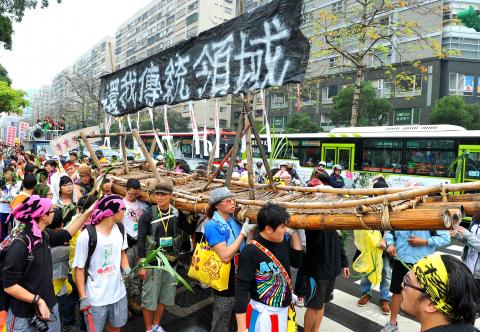More than 2,000 people, including many dressed in traditional Aboriginal garb, marched through the streets of Taipei yesterday afternoon protesting the controversial Miramar Resort Village construction project on Taitung County’s Shanyuan Beach (杉原沙灘).
The parade, initiated by an alliance of more than 40 civic groups and Aboriginal tribes from across the nation, was held to protest the development project, which has been ruled invalid more than once by the Supreme Administrative Court, but still gained approval at a local environmental impact assessment meeting last year and is scheduled to go into operation this year.
The march was titled “Don’t say goodbye to the eastern coastline,” and the protesters expressed concern that the Miramar case would set an example for other development projects along the eastern coastline and cause irreversible damage to the environment.

Photo: Chien Jung- Fong, Taipei Times
The crowd in Taipei was joined by a group of people that had marched for 17 days from Taitung to Taipei.
At the head of the parade was an Amis bamboo raft with a banner that read “Return our domain to us,” carried by 20 men, to express their hope to live in harmony with nature.
The protesters said the hand-made raft represents the idea of taking “just enough” from nature instead of abusing and exhausting natural resources.
“Aborigines do not have a specific life philosophy, but they do feel strongly connected to the land,” Aboriginal folk singer Panai said. “Please feel our affection for the land. This is what residents in Taipei have lost.”
The parade marched through the streets of Taipei, singing an Aboriginal verse signifying waves and the ocean in response to the chanting of Aboriginal folk singer Nabu.
They shouted demands such as “tear down the Miramar, protect the eastern coastline,” “protect our homeland” and “we don’t want cement dumped on the beach.”
The protesters arrived at the Miramar Garden Taipei (美麗信花園酒店), a hotel owned by the same corporation as the Miramar Resort Village in Taitung, and the crowd waved silver grass, mimicking a ritual aimed at expelling evil spirits and purifying the heart.
Reaching Ketagalan Boulevard in front of the Presidential Office, the protesters held hands and performed an Amis harvest festival dance.
The leader of the walking group, Lai Ching-lung (賴進龍), born in the Malan Tribe of Taitung, walked the whole journey to Taipei barefoot.
He said the journey had been exhausting, but while walking through the many tribes along the way, he felt the significance of bringing their message of protecting traditions and the environment to the Presidential Office.
“I hate that the government is treating us like this. It is using inappropriate measures to take our land and ocean from us.” Lai said, adding: “The coast is where the Amis used to collect food and live. Now we are concerned that the ocean will be polluted and destroyed by development projects.”

The first global hotel Keys Selection by the Michelin Guide includes four hotels in Taiwan, Michelin announced yesterday. All four received the “Michelin One Key,” indicating guests are to experience a “very special stay” at any of the locations as the establishments are “a true gem with personality. Service always goes the extra mile, and the hotel provides much more than others in its price range.” Of the four hotels, three are located in Taipei and one in Taichung. In Taipei, the One Key accolades were awarded to the Capella Taipei, Kimpton Da An Taipei and Mandarin Oriental Taipei. Capella Taipei was described by

EVA Airways today confirmed the death of a flight attendant on Saturday upon their return to Taiwan and said an internal investigation has been launched, as criticism mounted over a social media post accusing the airline of failing to offer sufficient employee protections. According to the post, the flight attendant complained of feeling sick on board a flight, but was unable to take sick leave or access medical care. The crew member allegedly did not receive assistance from the chief purser, who failed to heed their requests for medical attention or call an ambulance once the flight landed, the post said. As sick

The Taichung District Court yesterday confirmed its final ruling that the marriage between teenage heir Lai (賴) and a man surnamed Hsia (夏) was legally invalid, preventing Hsia from inheriting Lai’s NT$500 million (US$16.37 million) estate. The court confirmed that Hsia chose not to appeal the civil judgement after the court handed down its ruling in June, making the decision final. In the June ruling, the court said that Lai, 18, and Hsia, 26, showed “no mutual admiration before the marriage” and that their interactions were “distant and unfamiliar.” The judge concluded that the couple lacked the “true intention of

INDUSTRY: Beijing’s latest export measures go beyond targeting the US and would likely affect any country that uses Chinese rare earths or related tech, an academic said Taiwanese industries could face significant disruption from China’s newly tightened export controls on rare earth elements, as much of Taiwan’s supply indirectly depends on Chinese materials processed in Japan, a local expert said yesterday. Kristy Hsu (徐遵慈), director of the Taiwan ASEAN Studies Center at the Chung-Hua Institution for Economic Research, said that China’s latest export measures go far beyond targeting the US and would likely affect any country that uses Chinese rare earths or related technologies. With Japan and Southeast Asian countries among those expected to be hit, Taiwan could feel the impact through its reliance on Japanese-made semi-finished products and